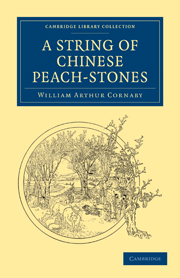
-
Select format
-
- Publisher:
- Cambridge University Press
- Publication date:
- March 2012
- June 2010
- ISBN:
- 9780511709395
- 9781108014106
- Dimensions:
- Weight & Pages:
- Dimensions:
- (216 x 140 mm)
- Weight & Pages:
- 0.63kg, 500 Pages
You may already have access via personal or institutional login
Book description
William Arthur Cornaby (1860–1921) was born in London and educated at the School of Mines before training as a Methodist minister. In 1885 Cornaby was sent as a missionary to Wuhan, central China, and A String of Chinese Peach-Stones (1895) was inspired by his experiences. Cornaby explains that his title suggests that the reader possesses 'a collection of desiccated tales, legends, and the like, picked up here and there along the highways and byways of China'. Cornaby's work covers the period 1849–1867, and discusses the major episodes of the Taiping Rebellion (1850–1864) as well as providing a detailed account of village life in central China, with its farm work, foods, festivals, customs and rituals that remains of interest to anthropologists and historians today. Cornaby's aim was to educate his English readers and to interest them in the culture that so dominated his own life and work.
Contents
Metrics
Full text views
Full text views help Loading metrics...
Loading metrics...
* Views captured on Cambridge Core between #date#. This data will be updated every 24 hours.
Usage data cannot currently be displayed.
Accessibility standard: Unknown
Why this information is here
This section outlines the accessibility features of this content - including support for screen readers, full keyboard navigation and high-contrast display options. This may not be relevant for you.
Accessibility Information
Accessibility compliance for the PDF of this book is currently unknown and may be updated in the future.

